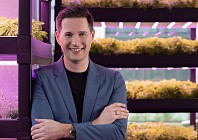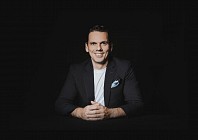After graduating from design school in Milan, Ennio Capasa hit the road on a voyage of discovery that would lead him first to Tokyo and then around the world in pursuit of the ‘energy’ that inspires his groundbreaking creative designs. Along the way, he founded the Italian fashion house CoSTUME NATIONAL, which became famous for designs characterised by dark colours and an edgy, underground vibe, often inspired by the urban centres Capasa encountered on his travels.
With a list of celebrity followers and friends that includes Mick Jagger, Lenny Kravitz, Cameron Diaz, Nicole Kidman and Madonna, Capasa has plenty of support from the A-list, but he believes that it is his constant quest for personal growth, understanding and visceral experiences that play the biggest role in his success as a person and a designer.
How important is travel in your line of work?
Fashion is one of the oldest global businesses. In the beginning of the 20th century, [Paul] Poiret went to the US to sell his products, so there is this kind of connection between fashion and travel. It’s a global language; it’s like music. For me, as a creative person, travel means not just understanding the feeling and energy of a place, but it’s also a source of stimulation and creativity. Travel for me has two values. One is personal, which is a kind of therapy; travel is the best therapy to refresh myself. The other is inspiration.
Could you do what you do without travel?
I don’t think so. The internet lets you see whatever you want, but in my experience, the energy of the people and the electricity [of a city] give you a different perception of it. In the experience of travelling, there is the experience of life. We are travellers as human beings; it is in our DNA. The need to discover and to travel can only be satisfied with the physical experience. You can read the best books about a place, but until you go there and smell it and feel it on your skin, it doesn’t feel as real.
Where has your career taken you?
I’m a globetrotter who loves to travel. I spent a lot of my time when I was young in the Orient, because I was and I am still... not anxious, but I have this extra energy. That part of the world calmed me a lot and when I went to Thailand or the Philippines or India I found peace and beauty. But I also like also big cities. I think it is a question of balance. Sometimes, I like to go out of civilisation and enjoy nature, and sometimes I like to be in the middle of civilisation and feel the people and the smell and the energy.
Where do you find inspiration in big cities?
I made some of my most beautiful collections with a bit of rock-and-roll style when I came back from London. I saw a beautiful girl with amazing energy and I was inspired by that. The year before last I made a ‘New Wave’ collection that was very strong. I went to London and bought some old Joy Division books, and I was really inspired by that and I started drawing. In that sense, I think travelling is like eating — you need to do it.
What city has had the biggest impact on your career?
There are two big cities that have had a big impact for different reasons. One is Tokyo. I was there when I was 18 years old and it was just amazing. At the time there were no foreigners, no internet and no nothing. I started to work with a Japanese designer, Yohji Yamamoto. I learnt about the discipline of work, so it was a big lesson in life. Also, the quality in Japan is quite similar to the Italian approach to quality.
It was an incredible lesson. I also had a lot of experience in terms of human relationships that made me grow a lot. I went to New York after that, where I learnt about the multicultural scene and the energy of art, which influenced me a lot, and the beautiful mixture of people. I realised how diversity can be the best part of this planet. Richness comes from diversity. That was another amazing shock. For different reasons, they are both very important contributors to my personal ideas.
How do you describe your design philosophy?
In my philosophy in general, the most important thing is combining the future and the past. Take, for example, the new CoSTUME NATIONAL shop in Milan that we just opened. I found a very rare marble in the south of the Sahara, in a cave near to Sudan. It is black with little gold and white [flecks], but it is really superior. For some reason it is not used yet. I am crazy about looking for new things. We brought it to Milan and I mixed this marble with concrete, and it is super beautiful. I like to mix the experience of traditional and futuristic all together.
You have done several notable brand collaborations — do you see opportunities in travel?
I would like to. My brother and I own a home in the south of Italy with a beach. We already started to produce wine and we have a lot of land. Sooner or later, when I have a little time, I will seriously think about doing something there.
You spoke about fashion celebrating the diversity of the world, but at the same time, big brands have stores all over the world — isn’t that making the world a smaller place?
It’s totally true. This is globalisation, in both a good and a bad way. At the moment, everything is very polished and very amazing but ultimately boring somehow, because everything looks the same. I was a bit shocked yesterday when I went to a store and I saw that all the big brand bags look more or less the same. We are starting to lose a bit of creativity in a way. But I think it is just a moment — independent design will return and some genius will bring back some new ideas.
Do you notice that when you travel around the world?
Two weeks ago I was in Marrakech for a long weekend. I hadn’t been to Marrakech for three years. I went to the souq and I was shocked because three years ago the people dressed in jalabiyas and wore Berber jewellery and whatever, but three years later, 50 percent of what was sold in the souq was fake Nike, fake Vuitton and they dress European. I thought that where we are going is so sad because we are going to lose all richness of the planet. But I think it is just a moment; it is a wave that will come back.
When you travel to relax, what makes a destination?
I was born by the seaside so, for me, seeing the water makes me calm. The best is when I have the water in the front and mountains at the back. But basically, especially when I am really tired, I look for somewhere where I can see water. I like the mountains because I think there is some mystery in the mountains. Mountains are quite sexy in my opinion. The jungle is so rich and generous, which is amazing, but in a way, obvious because there is so much. And the desert is amazing because you just connect with yourself.
What are your favourite hotels in the world?
One is the Four Seasons Hotel Tokyo at Marunouchi. Then I like Claridge’s in London. It’s very classical but I have lots of memories there. In New York, I like The Mercer, because I have been going there since the first day it was open and it has a lot of memories, too. Places for me are linked with the emotions. I am a really emotional person and my life is based on emotions. Beauty without emotion will have a short life. But, beauty with emotion will have a longer life.
What is the ultimate luxury travel experience for you?
I was in LA a while ago and I hadn’t been there for quite a while. I was staying in Chateau Marmont and I really enjoyed it. LA is not for everyone because it can be a very boring city, but it is a city you have to discover. I live in Milan, which is not an obvious city; sometimes you think it is boring, but if you find your place and know how to live there, it can be amazing. If you know how to live in LA, it is perfect. You can make a deal in the pool, there is always beautiful weather and you can drive and dream for a hundred miles and just be creative while looking at nature. So I re-evaluated LA as a possible place for me to spend more time.
What have you learnt about yourself through a lifetime of travel experiences?
Life is a lesson for myself every day. I always try to learn something from the people I meet and from travelling. Travelling is not just a visual experience — it is much more than that because it allows you to understand much more deeply. You can be very superficial and just enjoy the aesthetic part and the beauty. Or, you can be touched by experiences and the people you meet, and the reality of a place.
In my opinion, you are obliged to grow until you die, because that is the only way to make sense in your life. The point at which you say you understand everything and you know what you are talking about, you are dead. I want to die when I’m dying. Travelling is the opportunity to grow and to make yourself better. That’s it.












